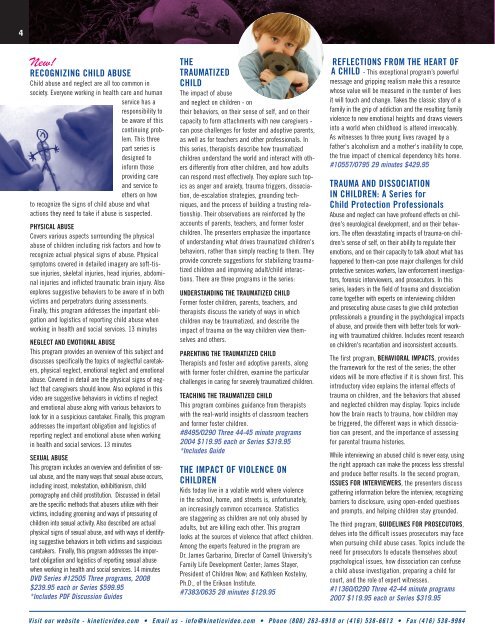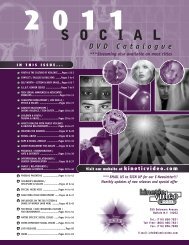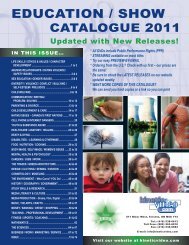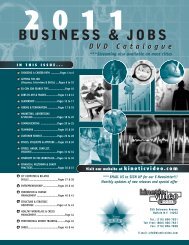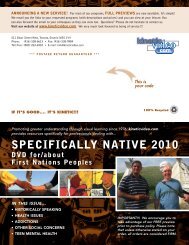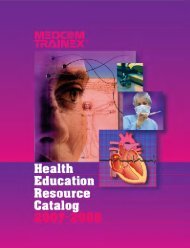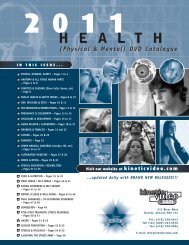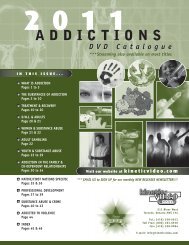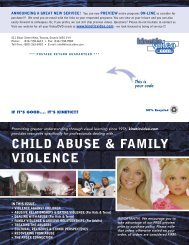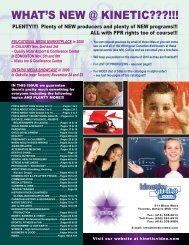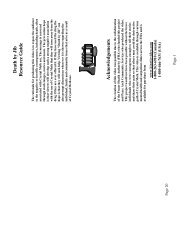CHILD ABUSE & FAMILY VIOLENCE - Kinetic Video
CHILD ABUSE & FAMILY VIOLENCE - Kinetic Video
CHILD ABUSE & FAMILY VIOLENCE - Kinetic Video
- No tags were found...
Create successful ePaper yourself
Turn your PDF publications into a flip-book with our unique Google optimized e-Paper software.
4<br />
New!<br />
RECOGNIZING <strong>CHILD</strong> <strong>ABUSE</strong><br />
Child abuse and neglect are all too common in<br />
society. Everyone working in health care and human<br />
service has a<br />
responsibility to<br />
be aware of this<br />
continuing problem.<br />
This three<br />
part series is<br />
designed to<br />
inform those<br />
providing care<br />
and service to<br />
others on how<br />
to recognize the signs of child abuse and what<br />
actions they need to take if abuse is suspected.<br />
PHYSICAL <strong>ABUSE</strong><br />
Covers various aspects surrounding the physical<br />
abuse of children including risk factors and how to<br />
recognize actual physical signs of abuse. Physical<br />
symptoms covered in detailed imagery are soft-tissue<br />
injuries, skeletal injuries, head injuries, abdominal<br />
injuries and inflicted traumatic brain injury. Also<br />
explores suggestive behaviors to be aware of in both<br />
victims and perpetrators during assessments.<br />
Finally, this program addresses the important obligation<br />
and logistics of reporting child abuse when<br />
working in health and social services. 13 minutes<br />
NEGLECT AND EMOTIONAL <strong>ABUSE</strong><br />
This program provides an overview of this subject and<br />
discusses specifically the topics of neglectful caretakers,<br />
physical neglect, emotional neglect and emotional<br />
abuse. Covered in detail are the physical signs of neglect<br />
that caregivers should know. Also explored in this<br />
video are suggestive behaviors in victims of neglect<br />
and emotional abuse along with various behaviors to<br />
look for in a suspicious caretaker. Finally, this program<br />
addresses the important obligation and logistics of<br />
reporting neglect and emotional abuse when working<br />
in health and social services. 13 minutes<br />
SEXUAL <strong>ABUSE</strong><br />
This program includes an overview and definition of sexual<br />
abuse, and the many ways that sexual abuse occurs,<br />
including incest, molestation, exhibitionism, child<br />
pornography and child prostitution. Discussed in detail<br />
are the specific methods that abusers utilize with their<br />
victims, including grooming and ways of pressuring of<br />
children into sexual activity. Also described are actual<br />
physical signs of sexual abuse, and with ways of identifying<br />
suggestive behaviors in both victims and suspicious<br />
caretakers. Finally, this program addresses the important<br />
obligation and logistics of reporting sexual abuse<br />
when working in health and social services. 14 minutes<br />
DVD Series #12505 Three programs, 2008<br />
$239.95 each or Series $599.95<br />
*Includes PDF Discussion Guides<br />
THE<br />
TRAUMATIZED<br />
<strong>CHILD</strong><br />
The impact of abuse<br />
and neglect on children - on<br />
their behaviors, on their sense of self, and on their<br />
capacity to form attachments with new caregivers -<br />
can pose challenges for foster and adoptive parents,<br />
as well as for teachers and other professionals. In<br />
this series, therapists describe how traumatized<br />
children understand the world and interact with others<br />
differently from other children, and how adults<br />
can respond most effectively. They explore such topics<br />
as anger and anxiety, trauma triggers, dissociation,<br />
de-escalation strategies, grounding techniques,<br />
and the process of building a trusting relationship.<br />
Their observations are reinforced by the<br />
accounts of parents, teachers, and former foster<br />
children. The presenters emphasize the importance<br />
of understanding what drives traumatized children's<br />
behaviors, rather than simply reacting to them. They<br />
provide concrete suggestions for stabilizing traumatized<br />
children and improving adult/child interactions.<br />
There are three programs in the series:<br />
UNDERSTANDING THE TRAUMATIZED <strong>CHILD</strong><br />
Former foster children, parents, teachers, and<br />
therapists discuss the variety of ways in which<br />
children may be traumatized, and describe the<br />
impact of trauma on the way children view themselves<br />
and others.<br />
PARENTING THE TRAUMATIZED <strong>CHILD</strong><br />
Therapists and foster and adoptive parents, along<br />
with former foster children, examine the particular<br />
challenges in caring for severely traumatized children.<br />
TEACHING THE TRAUMATIZED <strong>CHILD</strong><br />
This program combines guidance from therapists<br />
with the real-world insights of classroom teachers<br />
and former foster children.<br />
#8495/0290 Three 44-45 minute programs<br />
2004 $119.95 each or Series $319.95<br />
*Includes Guide<br />
THE IMPACT OF <strong>VIOLENCE</strong> ON<br />
<strong>CHILD</strong>REN<br />
Kids today live in a volatile world where violence<br />
in the school, home, and streets is, unfortunately,<br />
an increasingly common occurrence. Statistics<br />
are staggering as children are not only abused by<br />
adults, but are killing each other. This program<br />
looks at the sources of violence that affect children.<br />
Among the experts featured in the program are<br />
Dr. James Garbarino, Director of Cornell University's<br />
Family Life Development Center; James Stayer,<br />
President of Children Now; and Kathleen Kostelny,<br />
Ph.D., of the Erikson Institute.<br />
#7383/0635 28 minutes $129.95<br />
REFLECTIONS FROM THE HEART OF<br />
A <strong>CHILD</strong> - This exceptional program’s powerful<br />
message and gripping realism make this a resource<br />
whose value will be measured in the number of lives<br />
it will touch and change. Takes the classic story of a<br />
family in the grip of addiction and the resulting family<br />
violence to new emotional heights and draws viewers<br />
into a world when childhood is altered irrevocably.<br />
As witnesses to three young lives ravaged by a<br />
father's alcoholism and a mother's inability to cope,<br />
the true impact of chemical dependency hits home.<br />
#10557/0795 29 minutes $429.95<br />
TRAUMA AND DISSOCIATION<br />
IN <strong>CHILD</strong>REN: A Series for<br />
Child Protection Professionals<br />
Abuse and neglect can have profound effects on children's<br />
neurological development, and on their behaviors.<br />
The often devastating impacts of trauma-on children's<br />
sense of self, on their ability to regulate their<br />
emotions, and on their capacity to talk about what has<br />
happened to them-can pose major challenges for child<br />
protective services workers, law enforcement investigators,<br />
forensic interviewers, and prosecutors. In this<br />
series, leaders in the field of trauma and dissociation<br />
come together with experts on interviewing children<br />
and prosecuting abuse cases to give child protection<br />
professionals a grounding in the psychological impacts<br />
of abuse, and provide them with better tools for working<br />
with traumatized children. Includes recent research<br />
on children's recantation and inconsistent accounts.<br />
The first program, BEHAVIORAL IMPACTS, provides<br />
the framework for the rest of the series; the other<br />
videos will be more effective if it is shown first. This<br />
introductory video explains the internal effects of<br />
trauma on children, and the behaviors that abused<br />
and neglected children may display. Topics include<br />
how the brain reacts to trauma, how children may<br />
be triggered, the different ways in which dissociation<br />
can present, and the importance of assessing<br />
for parental trauma histories.<br />
While interviewing an abused child is never easy, using<br />
the right approach can make the process less stressful<br />
and produce better results. In the second program,<br />
ISSUES FOR INTERVIEWERS, the presenters discuss<br />
gathering information before the interview, recognizing<br />
barriers to disclosure, using open-ended questions<br />
and prompts, and helping children stay grounded.<br />
The third program, GUIDELINES FOR PROSECUTORS,<br />
delves into the difficult issues prosecutors may face<br />
when pursuing child abuse cases. Topics include the<br />
need for prosecutors to educate themselves about<br />
psychological issues, how dissociation can confuse<br />
a child abuse investigation, preparing a child for<br />
court, and the role of expert witnesses.<br />
#11360/0290 Three 42-44 minute programs<br />
2007 $119.95 each or Series $319.95<br />
Visit our website - kineticvideo.com • Email us - info@kineticvideo.com • Phone (800) 263-6910 or (416) 538-6613 • Fax (416) 538-9984


